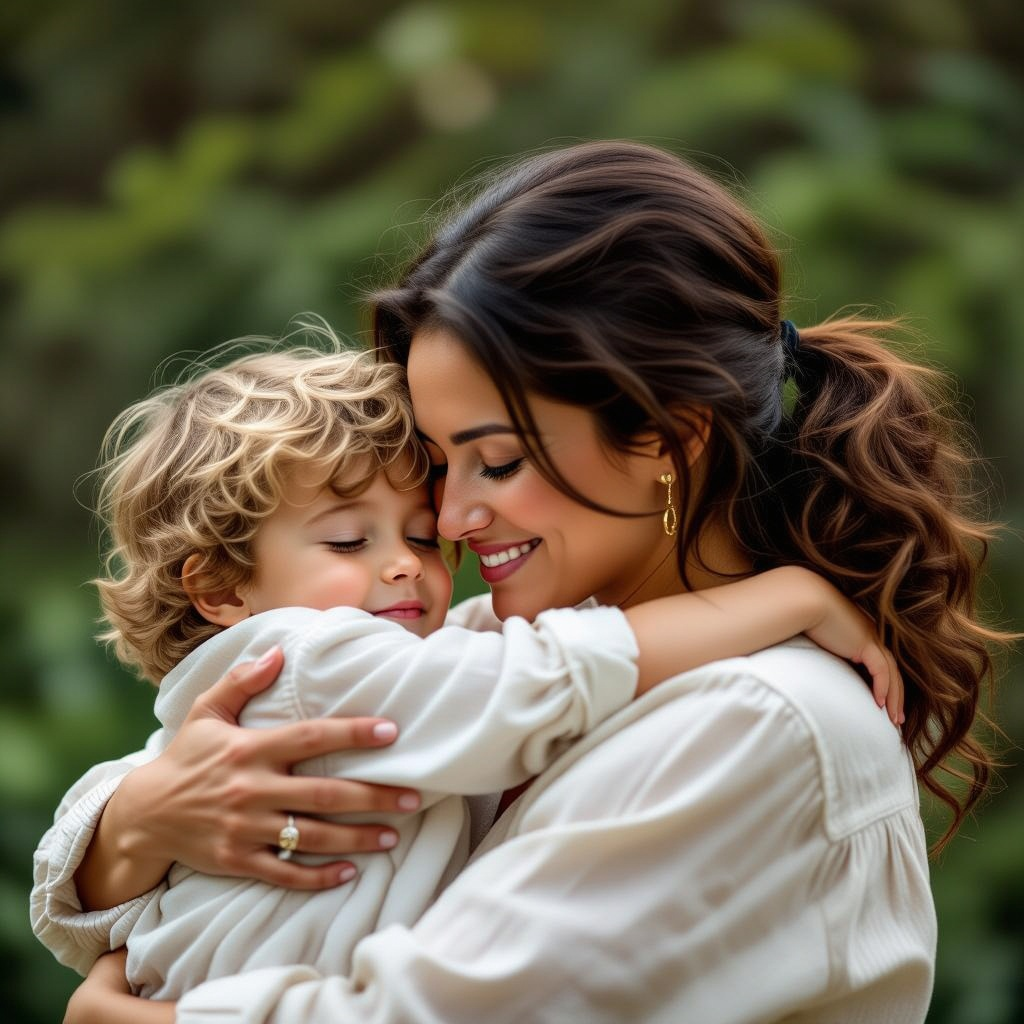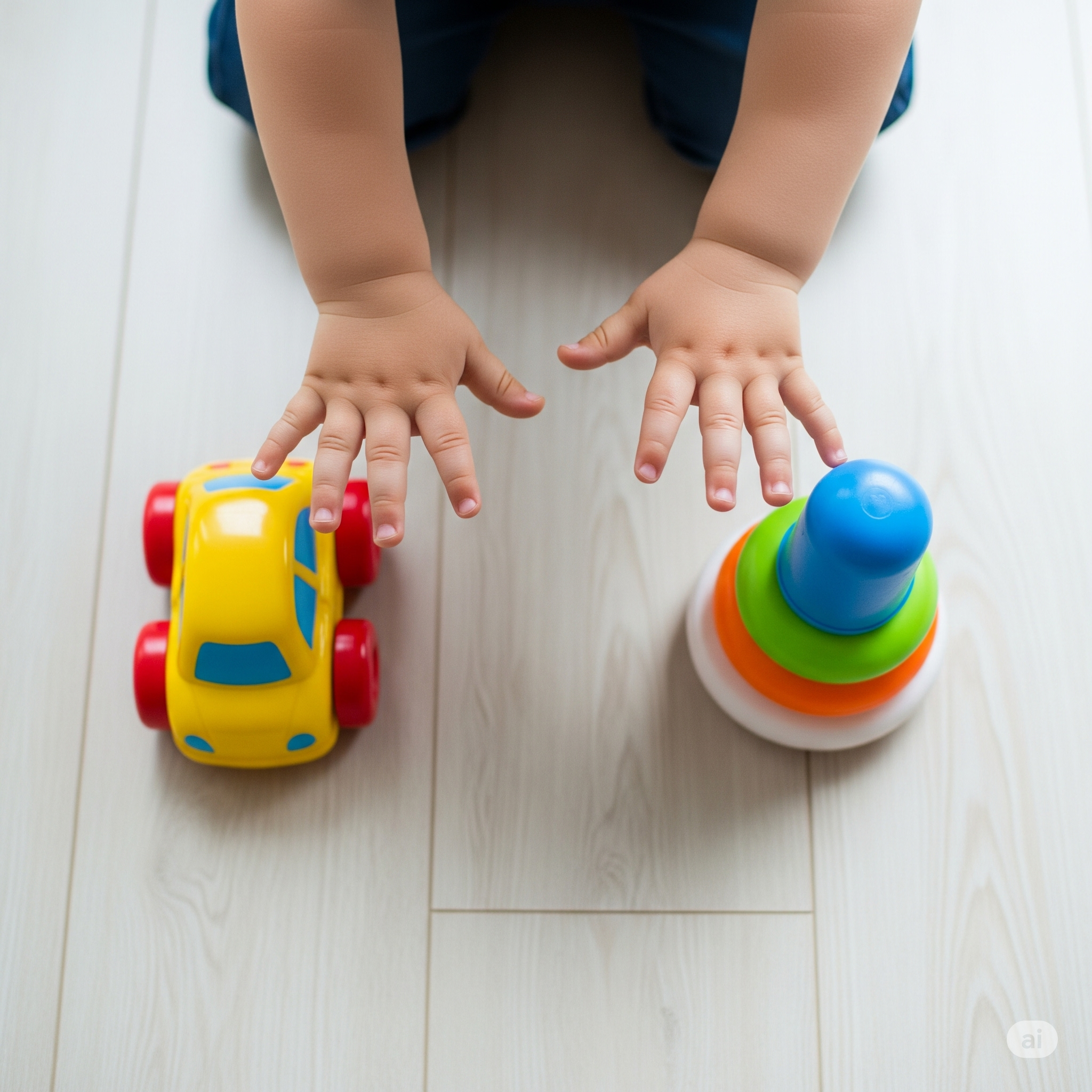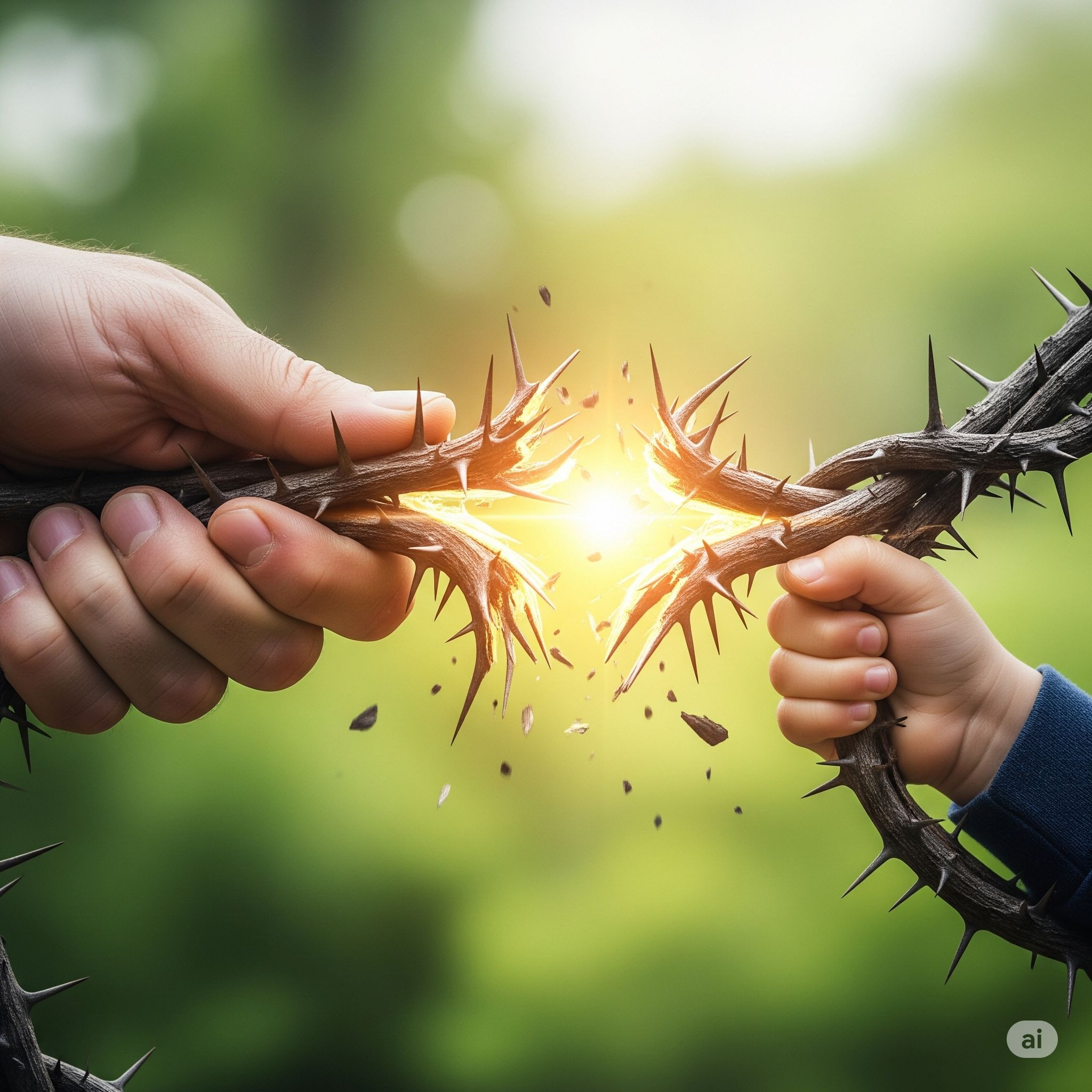¡Hola, mi querida comunidad de @motherhood ! ❤️

Hoy quiero que hablemos de corazón a corazón sobre un tema que seguro resuena en muchas de nosotras: la crianza. Últimamente, escuchamos mucho sobre la "crianza respetuosa", esa idea hermosa de construir una relación más horizontal y cómplice con nuestros pequeños.
Sin embargo, sé que muchas crecimos de otra manera. Crecimos en un mundo más vertical, donde la palabra del adulto era ley, sin espacio para cuestionar o expresar lo que sentíamos. Nos decían "hazlo porque yo lo digo", y bastaba. Es probable que, si conversamos con nuestros padres o abuelos, nos digan con total convicción que "así se hacían las cosas" y que gracias a eso crecieron "bien", como personas de provecho.
Y no dudo de su amor, ¡jamás! Pero me pregunto, con todo el cariño del mundo, ¿qué significa realmente haber "crecido bien"?
A veces, detrás de ese "estoy bien", se esconden adultos a los que les cuesta pedir ayuda, que cuando un problema los desborda, se aíslan. Adultos que reaccionan con rabia ante un conflicto o que, por el contrario, se achican ante una burla y no saben cómo poner límites. Somos la generación a la que le enseñaron a callar para no molestar, y hoy, a veces, nos cuesta encontrar nuestra propia voz. Crecimos pensando que merecíamos el castigo, la indiferencia o la falta de un "¡tú puedes!", y nos convencimos de que eso era lo normal.

Hoy quiero que hablemos de corazón a corazón sobre un tema que seguro resuena en muchas de nosotras: la crianza. Últimamente, escuchamos mucho sobre la "crianza respetuosa", esa idea hermosa de construir una relación más horizontal y cómplice con nuestros pequeños.
Sin embargo, sé que muchas crecimos de otra manera. Crecimos en un mundo más vertical, donde la palabra del adulto era ley, sin espacio para cuestionar o expresar lo que sentíamos. Nos decían "hazlo porque yo lo digo", y bastaba. Es probable que, si conversamos con nuestros padres o abuelos, nos digan con total convicción que "así se hacían las cosas" y que gracias a eso crecieron "bien", como personas de provecho.
Y no dudo de su amor, ¡jamás! Pero me pregunto, con todo el cariño del mundo, ¿qué significa realmente haber "crecido bien"?
A veces, detrás de ese "estoy bien", se esconden adultos a los que les cuesta pedir ayuda, que cuando un problema los desborda, se aíslan. Adultos que reaccionan con rabia ante un conflicto o que, por el contrario, se achican ante una burla y no saben cómo poner límites. Somos la generación a la que le enseñaron a callar para no molestar, y hoy, a veces, nos cuesta encontrar nuestra propia voz. Crecimos pensando que merecíamos el castigo, la indiferencia o la falta de un "¡tú puedes!", y nos convencimos de que eso era lo normal.
¿Crianza respetuosa es dejar que hagan lo que quieran? ¡Para nada!
Uno de los grandes mitos es pensar que criar con respeto es sinónimo de permisividad. ¡Nada más lejos de la realidad! Criar con respeto no es dejar que los niños no tengan reglas; es enseñarles esas reglas sin tener que imponerlas desde el miedo. Se trata de dejar de lado esa necesidad de demostrar una "autoridad" que no se basa en la conexión, sino en el poder.
Aquí es donde entra la magia de la negociación y de ofrecer opciones. En lugar de un "¡Ponte los zapatos ahora!", podemos intentar con un "¿Prefieres los zapatos azules o los rojos para ir al parque?". El niño siente que tiene el control, que su opinión vale, y nosotros logramos el objetivo de que se prepare para salir. Es un ganar-ganar.
Aquí es donde entra la magia de la negociación y de ofrecer opciones. En lugar de un "¡Ponte los zapatos ahora!", podemos intentar con un "¿Prefieres los zapatos azules o los rojos para ir al parque?". El niño siente que tiene el control, que su opinión vale, y nosotros logramos el objetivo de que se prepare para salir. Es un ganar-ganar.

Y cuando llega el caos... ¿qué hacemos?
Seamos honestas: ¡claro que hay momentos de desborde! Pataletas, gritos, puertas que se azotan... ¡somos humanas criando a pequeños humanos! La verdadera pregunta es: ¿cómo navegamos esa tormenta? ¿Lo hacemos desde la amenaza, el chantaje y el "me vas a escuchar"? ¿O respiramos profundo y elegimos la calma, la empatía y el respeto?
Cada berrinche es una oportunidad. Una oportunidad para romper esa cadena que quizás cargamos. La del padre que se ponía furioso porque no sabía expresar su frustración de otra manera, o la de la madre a la que le silenciaron tanto la voz que hoy, de adulta, no sabe decir "no" cuando es necesario.
Cada berrinche es una oportunidad. Una oportunidad para romper esa cadena que quizás cargamos. La del padre que se ponía furioso porque no sabía expresar su frustración de otra manera, o la de la madre a la que le silenciaron tanto la voz que hoy, de adulta, no sabe decir "no" cuando es necesario.

Yo elijo aprender. Elijo cada día buscar una nueva herramienta para construir un futuro más sano para mi hijo. Y elijo compartirlo con quien, como tú, quiera escuchar o leer.
Siempre decimos que la sociedad necesita cambiar, ser más amable, menos violenta. Pues, ¿saben qué?
Siempre decimos que la sociedad necesita cambiar, ser más amable, menos violenta. Pues, ¿saben qué?
Ese cambio gigante que soñamos empieza en el rincón más pequeño y poderoso de todos: nuestro hogar.
Las herramientas que les demos a nuestros hijos hoy serán las que usen para construir su mundo mañana. Y en nuestras manos está que ese mundo sea un lugar maravilloso.
He leído comentarios de gente que dice: "A mí nunca me pegaron, pero con una mirada de mi papá me quedaba tieso". Y lo cuentan como una victoria. Otros agradecen los "buenos azotes a tiempo" que, según ellos, los hicieron gente de bien. Nuestra memoria es sabia y, a veces, para protegernos, esconde el dolor. Quizás, detrás de esa mirada que paralizaba, había un miedo profundo a lo que podía venir después.
No estoy aquí para juzgar a nadie. Todas, como madres, padres o cuidadores, hacemos lo mejor que podemos con el amor que tenemos y las herramientas que nos dieron. Mi única intención es dejar una pequeña semilla de reflexión: sí, hacemos lo que podemos, pero siempre, siempre, podemos hacerlo un poquito mejor.
Porque al final del día, todos tenemos un mismo anhelo: criar seres humanos plenos, seguros y, sobre todo, felices.
He leído comentarios de gente que dice: "A mí nunca me pegaron, pero con una mirada de mi papá me quedaba tieso". Y lo cuentan como una victoria. Otros agradecen los "buenos azotes a tiempo" que, según ellos, los hicieron gente de bien. Nuestra memoria es sabia y, a veces, para protegernos, esconde el dolor. Quizás, detrás de esa mirada que paralizaba, había un miedo profundo a lo que podía venir después.
No estoy aquí para juzgar a nadie. Todas, como madres, padres o cuidadores, hacemos lo mejor que podemos con el amor que tenemos y las herramientas que nos dieron. Mi única intención es dejar una pequeña semilla de reflexión: sí, hacemos lo que podemos, pero siempre, siempre, podemos hacerlo un poquito mejor.
Porque al final del día, todos tenemos un mismo anhelo: criar seres humanos plenos, seguros y, sobre todo, felices.
Gracias por acompañarme en este pensamiento. Un abrazo inmenso.
@Omidiero
English Version
Hello, my dear @motherhood community! ❤️

Today, I want to have a heart-to-heart talk about a topic that surely resonates with many of us: parenting. Lately, we hear a lot about "respectful parenting," that beautiful idea of building a more horizontal and collaborative relationship with our little ones.
However, I know that many of us grew up differently. We grew up in a more vertical world, where the adult's word was law, with no room to question or express what we felt. We were told, "do it because I say so," and that was enough. It's likely that if we talk to our parents or grandparents, they'll tell us with complete conviction that "that's how things were done" and that thanks to it, they grew up "fine," as upstanding people.
And I never doubt their love, not for a moment! But I wonder, with all the love in the world, what does it really mean to have "grown up fine"?
Sometimes, behind that "I'm fine," hide adults who find it hard to ask for help, who isolate themselves when a problem overwhelms them. Adults who react with anger in a conflict or, conversely, shrink in the face of mockery and don't know how to set boundaries. We are the generation that was taught to be quiet so as not to bother, and today, we sometimes struggle to find our own voice. We grew up thinking we deserved the punishment, the indifference, or the lack of a "you can do it!", and we convinced ourselves that this was normal.

Today, I want to have a heart-to-heart talk about a topic that surely resonates with many of us: parenting. Lately, we hear a lot about "respectful parenting," that beautiful idea of building a more horizontal and collaborative relationship with our little ones.
However, I know that many of us grew up differently. We grew up in a more vertical world, where the adult's word was law, with no room to question or express what we felt. We were told, "do it because I say so," and that was enough. It's likely that if we talk to our parents or grandparents, they'll tell us with complete conviction that "that's how things were done" and that thanks to it, they grew up "fine," as upstanding people.
And I never doubt their love, not for a moment! But I wonder, with all the love in the world, what does it really mean to have "grown up fine"?
Sometimes, behind that "I'm fine," hide adults who find it hard to ask for help, who isolate themselves when a problem overwhelms them. Adults who react with anger in a conflict or, conversely, shrink in the face of mockery and don't know how to set boundaries. We are the generation that was taught to be quiet so as not to bother, and today, we sometimes struggle to find our own voice. We grew up thinking we deserved the punishment, the indifference, or the lack of a "you can do it!", and we convinced ourselves that this was normal.
Is Respectful Parenting About Letting Kids Do Whatever They Want? Not at All!
One of the biggest myths is thinking that parenting with respect is synonymous with permissiveness. Nothing could be further from the truth! Parenting with respect isn't about letting children have no rules; it's about teaching them those rules without having to impose them through fear. It's about setting aside the need to demonstrate an "authority" that isn't based on connection, but on power.
This is where the magic of negotiation and offering choices comes in. Instead of a "Put on your shoes now!", we can try, "Do you prefer the blue shoes or the red ones to go to the park?". The child feels they have control, that their opinion matters, and we achieve the goal of getting them ready to go out. It's a win-win.
This is where the magic of negotiation and offering choices comes in. Instead of a "Put on your shoes now!", we can try, "Do you prefer the blue shoes or the red ones to go to the park?". The child feels they have control, that their opinion matters, and we achieve the goal of getting them ready to go out. It's a win-win.

And When Chaos Erupts... What Do We Do?
Let's be honest: of course, there are moments of meltdown! Tantrums, screams, slammed doors... we are humans raising little humans! The real question is: how do we navigate that storm? Do we do it with threats, blackmail, and a "you will listen to me"? Or do we take a deep breath and choose calm, empathy, and respect?
Every tantrum is an opportunity. An opportunity to break the chain we might be carrying. The chain of the father who got furious because he didn't know how to express his frustration any other way, or the mother whose voice was silenced so much that today, as an adult, she doesn't know how to say "no" when she needs to.
Every tantrum is an opportunity. An opportunity to break the chain we might be carrying. The chain of the father who got furious because he didn't know how to express his frustration any other way, or the mother whose voice was silenced so much that today, as an adult, she doesn't know how to say "no" when she needs to.

I choose to learn. I choose every day to find a new tool to build a healthier future for my son. And I choose to share it with those who, like you, want to listen or read.
We always say that society needs to change, to be kinder, less violent. Well, you know what?
We always say that society needs to change, to be kinder, less violent. Well, you know what?
That giant change we dream of begins in the smallest and most powerful corner of all: our home.
The tools we give our children today are the ones they will use to build their world tomorrow. And it is in our hands to make that world a wonderful place.
I've read comments from people who say, "I was never hit, but one look from my dad and I would freeze." And they tell it like a victory. Others are grateful for the "timely spankings" that, according to them, made them good people. Our memory is wise and, sometimes, to protect us, it hides the pain. Perhaps, behind that paralyzing look, there was a deep-seated fear of what might come next.
I'm not here to judge anyone. All of us, as mothers, fathers, or caregivers, do the best we can with the love we have and the tools we were given. My only intention is to leave a small seed for reflection: yes, we do what we can, but we can always, always, do a little better.
Because at the end of the day, we all share the same desire: to raise whole, confident, and, above all, happy human beings.
I've read comments from people who say, "I was never hit, but one look from my dad and I would freeze." And they tell it like a victory. Others are grateful for the "timely spankings" that, according to them, made them good people. Our memory is wise and, sometimes, to protect us, it hides the pain. Perhaps, behind that paralyzing look, there was a deep-seated fear of what might come next.
I'm not here to judge anyone. All of us, as mothers, fathers, or caregivers, do the best we can with the love we have and the tools we were given. My only intention is to leave a small seed for reflection: yes, we do what we can, but we can always, always, do a little better.
Because at the end of the day, we all share the same desire: to raise whole, confident, and, above all, happy human beings.
Thank you for joining me in this thought. A huge hug.
@Omidiero
Las imágenes fueron hechas usando IA/The images were made using AI.